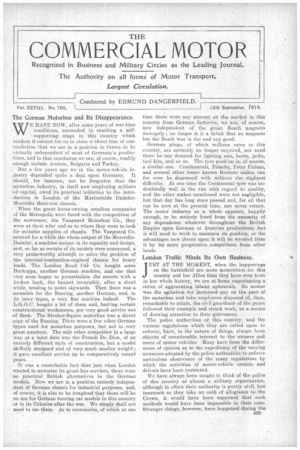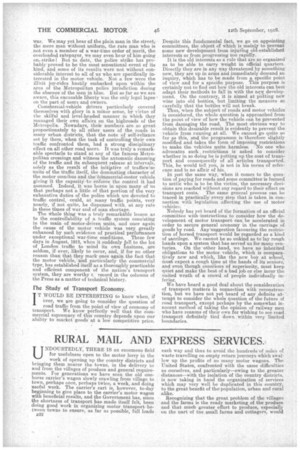The German Motorbus and Its Disappearance.
Page 1

Page 2

If you've noticed an error in this article please click here to report it so we can fix it.
WE HAVE NOW, after some years of war-time conditions, succeeded in reaching a selfsupporting stage in this country which renders it correct for us to state w:thout fear of contradiction that we are in a position in future to be virtually independent of most of Germany's productions, and in that conclusion we can, of course, readily enough include Austria, Bulgaria and Turkey. But a few years ago we in the motor-vehicle industry depended quite a deal upon Germany. It should, for instance, not be forgotten that the motorbus industry, in itself now employing millions of capital, owed its practical initiation to the introduction in London of the Marienfelde Daimler Mercedes three-ton chassis. .
When the great horse-owning omnibus companies of the Metropolis were faced with the competition of the newcomer, the Vanguard Motorbus Co., they were at their wits' end as to where they were to look for suitable supplies of chassis. The Vanguard Co. secured for a while the whole output of the MercedesDaimler, a machine unique in its capacity and design, and, so far as certain of its models were concerned, a very praiseworthy atternft to solve the problem of the internal-combustion-engined chassis for heavy loads. The London Road Car Co. bought some Durkopps, another German . machine, and one that very soon began to perambulate the streets with a broken back, the bonnet invariably, after a short while, tending to point skywards. Then there was a scramble for the Bussing, another German, and, in its later types, a very fine machine indeed. The L.G.O.C. bought a lot of them and, barring certain constructional weaknesses, got very good service out of them. The Straker-Squire motorbus was a direct copy of the Bussing. There were a few other German types used for motorbus purposes, but not in very great numbers. The .only other competitor in a large way at a later date was the French De Dion, of an entirely different style of construction, but a model skilfully designed and of very much smaller weight; it gave excellent service up to comparatively recent year. It was a remarkable fact that just when London wanted to motorize its great bus services, there were no practical British alternatives to the German models. Now we are in a position entirely independent of German chassis for industrial purposes, and, of course, it is also to be imagined that there will be no use for German touring car models in this country or in its Colonies after the war. We simply shall not need to use them. As to accessories, of which at one time there were any amount on the market in this country from German factories, we are, of course, now independent of the great Bosch magneto . monopoly ; no longer is it a fetish that no magneto but the Bosch was in the end any good. German plugs, of which millions came to this country, are certainly no longer required, nor need there be any demand for lighting sets, horns, jacks, tool kits, and so on. The tyre position is, of course, a similar one. Continentals, Polack, Peter Unions, and several other lesser known German makes can for ever be dispensed with without the slightest difficulty. At one time the Continental tyre was undoubtedly well in the van with regard to quality, and the other makes mentioned were not negligible, but that day has long since passed and, for all that can be seen at the present time, can never return. The motor industry as a whole appears, happily enough, to be entirely freed from the necessity of , any dependence whatever throughout the British Empire upon German or Austrian productions, but it will need to work to maintain its position, or the advantages now thrust upon it will be wrested from it by its more progressive competitors from other lands.
London Traffic Minds Its Own Business. UST AT THE MOMENT, when the happenings
4 on the battlefield are more momentous for this country and her Allies than they have ever been in her whole history, we are at home experiencing a series of aggravating labour upheavals. No sooner was the agitation for increased pay on the part of the motorbus and tube employees disposed of, than, remarkable to relate, the civil guardian h of the peace. followed their example and struck work, as a means of drawing attention to their grievances. The police authorities of this country, and the various regulations which they are called upon to enforce, have, in the nature of things, always been objects of considerable interest to the owners and users of motor vehicles. Many have been the differences of opinion as to the expediency of the varying measures adopted by the police authorities to enforce meticulous observance of the many regulations by which the activities of motor-vehicle owners and drivers have been restricted.
We have always been taught to think of the police of this country as almost a military organization, although in effect their authority is purely civil, but inasmuch as they take an oath of alkigiance to the Crown, it would have been supposed that such methods would have been impossible in their case. Stranger things, however, have happened during the
war. We may yet hear of the plain man in the street, the mere man without uniform, the rare man who is not even a member of a war-time order of nierit, the overloaded ratepayer, we may even hear of him going on. strike! But to date, the police strike has probably proved to be the most sensational event of its kind, and some of its results were not without considerable interest to all of us who are specifically interested in the motor vehicle. Not a few were the illicit joy-rides hastily embarked upon within the area of the Metropolitan police jurisdiction during the absence of the men in blue. But so far as we are aware, this excusable liberty was the only legal lapse on the part of users and owners.
Comniereial-vehicle drivers particularly covered themselves with glory in a minor sense, by virtue of the skilful and level-headed manner in which they managed their own affairs 011 the highroads of the Metropolis. Nowadays, their numbers are so great proportionately to all other users of the roads in many urban districts, that the note of self-reliance set by them, when the task of oontrolling their own traffic confronted them, had a strong disciplinary effect on all other road users. It was truly a remarkable spectacle to stand at any of the famous Metropolitan crossings and witness the automatic damming of the traffic and its subsequent release at intervals, solely as the result of the initiative of trafficwise units of the traffic itself, the dominating character of the motor omnibus and the -druniercial-motor vehicle giving it the capacity to enforce the control it had assumed. Indeed, it. was borne in upon many of us that perhaps not a little of that portion of the very exhaustive duties of the police which are devoted to traffic control, could, at many traffic points, very nearly, if not quite, be dispensed with, at any rate in these times of war and of man shortage. The ,Phole thing was a truly remarkable lesson as to the controllability of a traffic system consisting in the main of motor-driven units, and once again the cause of the motor vehicle was very greatly enhanced by such evidence of practical performance under exceptional war-time conditions. These few days in August, 1918, when it suddenly fell to the lot of London traffic to mind its own business, are seldom, if ever, likely to recur, and, if for no other reason than that they mark once again the fact that the motor vehicle, and particularly the commercial type, has established itself as a thoroughly practicable and efficient component of the nation's transport system, they are worthy t record in -the eolunins of the Press as a matter of technical history.
file Study of Transport Economy.
T WOULD BE INTERESTING to know when, if ever, we are going to consider the question of 1. road traffic from the point of view of economy of transport. We know perfectly well that the commercial supremacy of this country depends upon our ability to market goods at a low competitive price.
Despite this fundamental fact, we go on appointing committees, the object of which is mainly to nrevent some new development from injuring old-estiblished interests or from progressing too rapidly. It is the old interests as e rule that are so organized as to be able to carry weight in official quarters. Directly they are in any way threatened by something new, they are up in arms and immediately demand an inquiry, which has to be made from a specific point of view and for a specific purpose. This purpose is certainly not to find out how the old interests can best adapt their Methods to fall in with the new development. On the contrary, it is aimed at plating new wine into old bottles, but limiting the measure se carefully that the bottles will not break.
Thus? when the subject of roads and motor vehicles is considered, the whole question is approached from the point of view of how the vehicle can be prevented from damaging the road. The most obvious way to obtain this desirable result is evidently to prevent the vehicle from running at all. We cannot go quite so far as this, and the programme is 'therefore slightly modified and takes the form of imposing restrictions to make the vehicles quite harmless. No one who advocates such restrictions is asked to consider whether in so doing he is putting up the cost of transport and consequently of all articles transported. This, he would tell you, is not in his terms of reference and is no affair of his.
In just the same way, when it comes to the question of paying for roads and some committee is formed to settle who is to be the victim, the necessary decisions are reached without any regard to their effect on transport costs. The same general process can be traced in practically every step that is taken in connection with legislation affecting the use of motor vehicles.
Nobody has yet heard of the formation of an official committee withoinstructions to consider how the development of motor transport can be accelerated M order to secure general economy in the carriage of goods by road. Any suggestion favouring the restriction of horsed transport would be regarded as a kind of sacrilege. We cannot be so unkind as tolay rough hands upon a system that has served us for many centuries. On the 'other hand, we have no inherited obligations to the motor vehicle, which is comparatively new and which, like the new boy at school, Must expect a rough time at the hands of its seniors, and even though conscious of superiority, must keep quiet and make the best of a bad job or else incur the united wrath of a crowd of people individually inferior.
We have heard a good deal about the consideration: of transport matters in connection With reconstruction, but we have not yet heard of any definite attempt to consider the whole question of the future of road transport, except perhaps by the somewhat innocent method of taking the opinion of railway men who have reasons of their own for wishing to see road transport definitely tied down within very limited boundaries.






















